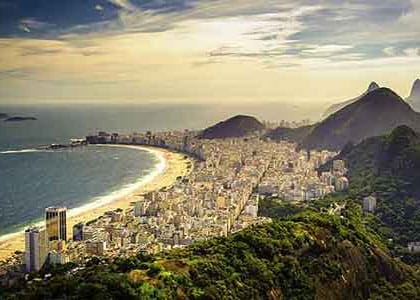Startup Scene Remains Strong in Brazil
Brazil’s brand as an economy has enjoyed some heady days in the 21st century. It’s been included in not one but two acronyms with China—BRIC and BRAC. As of late, however, its economy and image have suffered. That has not stopped a cluster of Wharton grads from adopting the South American giant as their entrepreneurial land of opportunity.
Ben Gleason, WG’07, has lived in Brazil since graduating from Wharton and has witnessed the macroeconomic ebb and flow. He worked for McKinsey for several years there, heard the bubble burst on Wall Street from a distance and has plenty of friends who lost finance jobs. Meanwhile, Brazil was less affected. By 2011, the country was really hot, he says, and that’s when Wharton grads came down in force.
Though Nicholas Reise, G’11, WG’11, worked in Brazil in banking before School, he counts as a member of this Wharton wave. He spent his first year and a half at Wharton figuring out how to leverage his Lauder Institute dual-degree (language: Portuguese) with his banking background to get back down to Brazil. His summer internship was with a small venture firm in the country.
“I saw the early makings of an Internet ecosystem in that first summer,” he says. Along with him in this Wharton emigration were friends like Jacob Rosenbloom and Davis Smith, both G’11, WG’11, and all of them were “very dedicated to the opportunity,” Reise recalls. Rosenbloom is still down there as CEO and president of Emprego Ligado, a mobile job recruiting platform. Smith only recently departed Brazil and his e-commerce startup Baby.com.br to launch a new company, Cotopaxi, in Utah.
Wharton’ers entered a startup ecosystem that was made up of three main entrepreneur groups— Europeans, Americans and young Brazilians—says Gleason. Local and international investors with cash were also present and competing to get into “deal flow,” recalls Reise.
As for Reise, he spent the first six months post-Wharton surfing couches in Sao Paolo. By the start of 2012, he had joined Redpoint Venture’s investment team and its early-stage, $130 million e-ventures capital fund.
Gleason founded his own company, GuiaBolso, a personal finance website, in 2012, leveraging his experience running Groupon Brazil for a year and previously launching payments startup SalesVu following his time at McKinsey.
They are both invested in Brazil, figuratively, with no admitted inkling of leaving. But can the same be said for other Wharton alums?
Since 2011, Brazil’s economic prospects have dipped. The country has underperformed against other developing markets. Experts cite many reasons, including government intervention, higher relative inflation, an equities slump, high labor costs and lower productivity. One result?
“It is much harder to raise money,” Gleason says, adding that he’s seen very little new VC fund activity so far this year. For his startup, he and his co-founder, whom he met at McKinsey, initially bootstrapped the company, but have since accessed local and international venture capital in a series-A round negotiated at last year’s close, just as the investment scene was drying up. (They announced the funding in May.)
Gleason sees a slowing of the Wharton MBA crowd, particularly expats, coming to Brazil as a response.
Still, Wharton grads were ahead of the curve compared with other MBAs, Reise believes, and they still represent an “outsized” presence in the ecosystem.
A search in WhartonConnect, the School’s online directory, turned up 844 alumni in Brazil, but only seven listed themselves as working in venture capital (including Reise), 14 in “Internet products and services” (including Smith), and four in “entrepreneurial.” We know of at least one entrepreneur not included here— Florian Hagenbuch, C’10, W’10, who launched Printi nearly two years ago—so perhaps it’s a matter of WhartonConnect data. (Hint: Alumni, update your info in WhartonConnect.)
As for what still draws and keeps Wharton expats, money is available in Brazil for the right entrepreneur.
“Investors have more capital than they had before, but they’re being selective,” Reise says.
Opportunity exists, which Reise defines as the “white space” of improving upon the mess of bureaucracies, inefficiencies and complexities in the country. And the country itself is vibrant, beautiful and friendly.
“Brazil is welcoming of foreigners and especially well-educated foreigners,” Reise says.
—Matthew Brodsky


























